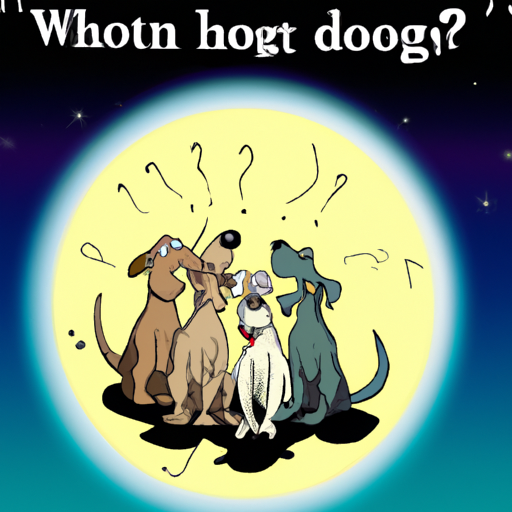As every dog owner knows, the bond between a person and their loyal canine companion is strong. It’s a relationship filled with tail wags, wet nose kisses, and, occasionally, a chorus of howls. But what does it mean when your dog howls? This behavior can be puzzling and even a bit unnerving, especially if you’re not sure of the reason behind it.
- Table of Contents
- Understanding Dog Howls
- Causes of Dog Howling
- Decoding the Howl
- How to Respond
-
FAQ
-
Key Takeaways
- Dogs howl for various reasons, including communication, attention-seeking, and responding to high-pitched sounds.
- The specific meaning of a howl can often be determined by the dog’s body language and the context in which the howling occurs.
- Appropriate responses to howling can include providing comfort, training, and, in some cases, seeking advice from a veterinarian or animal behaviorist.
Understanding Dog Howls
Dogs are descended from wolves, and howling is a primal behavior that’s deeply ingrained in their DNA. Wolves use howling as a form of communication, and our domesticated dogs have carried on this tradition. This can be seen clearly in breeds like Huskies and Alaskan Malamutes, which are closely related to their wild ancestors and often howl more than other breeds.
Howling is one of the many ways dogs communicate with us and each other. They use a variety of vocalizations, including barks, growls, whines, and, of course, howls. These sounds, combined with body language, help dogs express their needs, feelings, and moods. The American Kennel Club explains more about why dogs howl in this informative article.
Causes of Dog Howling
There are many reasons why dogs howl, and understanding these can help you better understand your canine companion. Here are a few common causes:
-
Communication: Dogs often howl to communicate with other dogs. This is particularly common in multi-dog households or in areas where there are many dogs nearby. They may be responding to the howls of other dogs or trying to send a message of their own.
-
Attention-seeking: Some dogs howl to get attention. If your dog howls and you respond by giving them attention (even if it’s to tell them to stop), they may learn that howling is a good way to get your attention.
-
Response to Sounds: Dogs often howl in response to certain sounds. High-pitched noises such as sirens, musical instruments, or the sound of other dogs howling can trigger this behavior.
-
Anxiety or Distress: Dogs that are anxious or distressed may howl as a form of self-soothing. This is common in dogs that have separation anxiety.
Decoding the Howl
The specific meaning of a dog’s howl can often be determined by their body language and the context in which the howling occurs. For example, a dog that howls with their ears back and tail tucked may be feeling anxious or scared. On the other hand, a dog that howls with their tail wagging and body relaxed is likely just being vocal.
In addition, the tone and pitch of the howl can provide clues about what the dog is trying to communicate. A high, prolonged howl is often a response to loneliness or boredom, while a low, short howl may be a warning or a sign of discomfort. You can find more about how to interpret your dog’s howls in this comprehensive guide from OneTopDog.com.
How to Respond
Your response to your dog’s howling will depend on the cause. If your dog is howling for attention, it’s important not to reinforce this behavior by giving them attention when they howl. Instead, reward them for being quiet and ignore them when they howl.
If your dog is howling in response to certain sounds, you may be able to reduce this behavior by providing a distraction or by desensitizing them to the sound. This article from OneTopDog.com provides some helpful tips for dealing with noise-induced howling.
In cases where the howling is caused by anxiety or distress, it may be necessary to seek advice from a veterinarian or an animal behaviorist. They can provide guidance on how to manage this behavior and can recommend treatments or therapies to help your dog feel more secure.
Frequently Asked Questions
Q: Why does my dog howl when I play music?
A: Some dogs howl in response to high-pitched sounds, and certain types of music can trigger this behavior. If your dog is relaxed and seems to be enjoying themselves, there’s no need to worry. However, if the howling seems to be causing them distress, you may want to change the music or lower the volume.
Q: My dog howls when I leave the house. Is this normal?
A: This could be a sign of separation anxiety. If your dog gets anxious when you’re not around, they may howl as a way of expressing their distress. If this behavior is causing problems, it may be worth consulting with a veterinarian or animal behaviorist.
Q: Is it bad if my dog howls a lot?
A: Frequent howling isn’t necessarily a problem, but it can be a sign that something is wrong. If your dog’s howling is accompanied by other signs of distress or discomfort, or if it’s causing a disturbance, you should seek advice from a professional. You can find more information about how to handle excessive howling in this helpful post from OneTopDog.com.
The world of dog communication is a fascinating one, filled with barks, growls, whines, and howls. By understanding what these sounds mean, you can deepen your bond with your dog and ensure that their needs are being met. Remember, when your dog howls, they’re not just making noise—they’re trying to tell you something.



